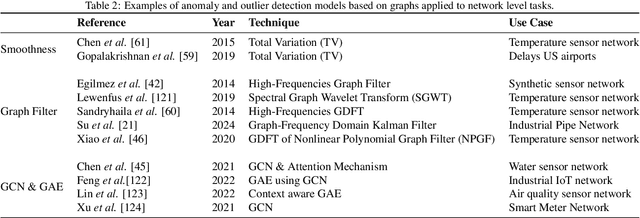A Review of Graph-Powered Data Quality Applications for IoT Monitoring Sensor Networks
Paper and Code
Oct 28, 2024



The development of Internet of Things (IoT) technologies has led to the widespread adoption of monitoring networks for a wide variety of applications, such as smart cities, environmental monitoring, and precision agriculture. A major research focus in recent years has been the development of graph-based techniques to improve the quality of data from sensor networks, a key aspect for the use of sensed data in decision-making processes, digital twins, and other applications. Emphasis has been placed on the development of machine learning and signal processing techniques over graphs, taking advantage of the benefits provided by the use of structured data through a graph topology. Many technologies such as the graph signal processing (GSP) or the successful graph neural networks (GNNs) have been used for data quality enhancement tasks. In this survey, we focus on graph-based models for data quality control in monitoring sensor networks. Furthermore, we delve into the technical details that are commonly leveraged for providing powerful graph-based solutions for data quality tasks in sensor networks, including missing value imputation, outlier detection, or virtual sensing. To conclude, we have identified future trends and challenges such as graph-based models for digital twins or model transferability and generalization.
 Add to Chrome
Add to Chrome Add to Firefox
Add to Firefox Add to Edge
Add to Edge